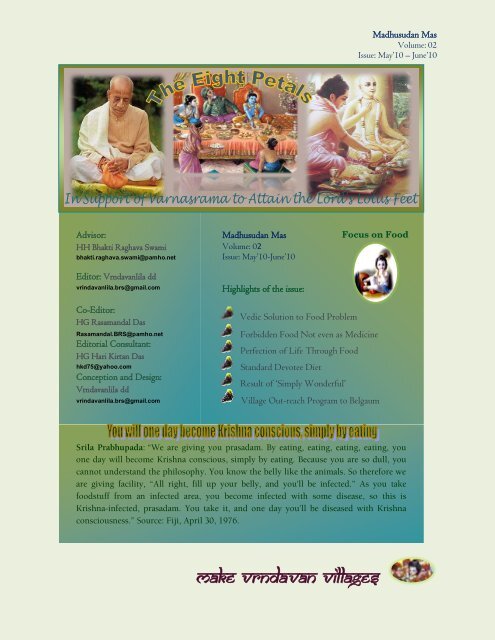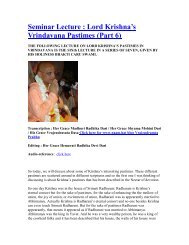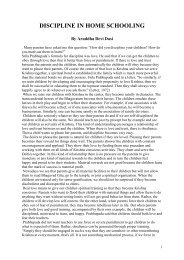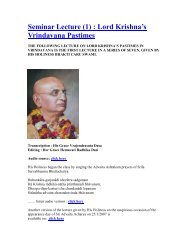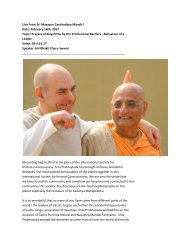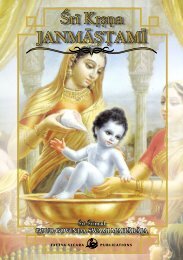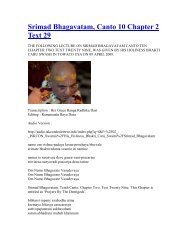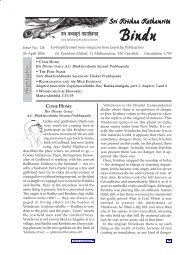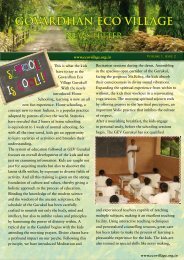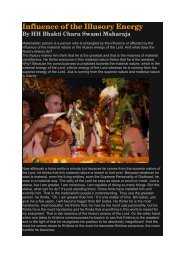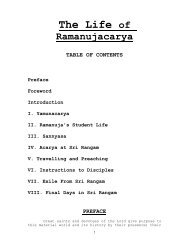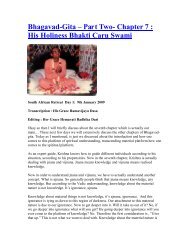Madhusudan Masa - The Eight Petals - ebooks - ISKCON desire tree
Madhusudan Masa - The Eight Petals - ebooks - ISKCON desire tree
Madhusudan Masa - The Eight Petals - ebooks - ISKCON desire tree
Create successful ePaper yourself
Turn your PDF publications into a flip-book with our unique Google optimized e-Paper software.
…………………..<br />
<strong>Madhusudan</strong> Mas<br />
Volume: 02<br />
Issue: May’10 – June’10<br />
Advisor:<br />
HH Bhakti Raghava Swami<br />
bhakti.raghava.swami@pamho.net<br />
Editor: Vrndavanlila dd<br />
vrindavanlila.brs@gmail.com<br />
<strong>Madhusudan</strong> Mas<br />
Volume: 02<br />
Issue: May’10-June’10<br />
Highlights of the issue:<br />
Focus on Food<br />
Co-Editor:<br />
HG Rasamandal Das<br />
Rasamandal.BRS@pamho.net<br />
Editorial Consultant:<br />
HG Hari Kirtan Das<br />
hkd75@yahoo.com<br />
Conception and Design:<br />
Vrndavanlila dd<br />
vrindavanlila.brs@gmail.com<br />
Vedic Solution to Food Problem<br />
Forbidden Food Not even as Medicine<br />
Perfection of Life Through Food<br />
Standard Devotee Diet<br />
Result of ‘Simply Wonderful’<br />
Village Out-reach Program to Belgaum<br />
Srila Prabhupada: “We are giving you prasadam. By eating, eating, eating, eating, you<br />
one day will become Krishna conscious, simply by eating. Because you are so dull, you<br />
cannot understand the philosophy. You know the belly like the animals. So therefore we<br />
are giving facility, “All right, fill up your belly, and you’ll be infected.” As you take<br />
foodstuff from an infected area, you become infected with some disease, so this is<br />
Krishna-infected, prasadam. You take it, and one day you’ll be diseased with Krishna<br />
consciousness.” Source: Fiji, April 30, 1976.<br />
Make Vrndavan Villages
<strong>Madhusudan</strong> Mas<br />
Volume: 02<br />
Issue: May’10 – June’10<br />
Hari-çauri: We were told it (aloe vera) was good for relieving high blood<br />
pressure and clearing the...<br />
Indian man: Relieving high blood<br />
pressure, best is garlic.<br />
Prabhupäda: Garlic.<br />
Indian man: Garlic, you don’t want it.<br />
(laughter)<br />
Prabhupäda: Garlic, onions, prohibited.<br />
(A.C. Bhaktivedanta Swami Prabhupada. 9th October<br />
1976. Room Conversation. Aligarth)<br />
Çréla Prabhupäda: No, if made sincerely<br />
with devotion, then Kåñëa will like it. Just like Vidura. Vidura was feeding<br />
Kåñëa bananas, but he was so absorbed in thought that he was throwing away<br />
the real bananas and he was giving Kåñëa the skin, and Kåñëa was eating. [All<br />
laugh] Kåñëa knew that he was giving in devotion, and Kåñëa can eat anything,<br />
provided there is devotion. It does not matter whether it is materially tasteful or<br />
not. Similarly, a devotee also takes Kåñëa prasäda, whether it is materially<br />
tasteful or not. We should accept everything. ... If devotion is not there, He<br />
doesn’t like any food, either tasteful or not tasteful. He does not accept it.<br />
A devotee: In India... Somebody—<br />
Çréla Prabhupäda: Oh, India, India. Don’t talk of India! Talk of philosophy. If<br />
there is no devotion, Kåñëa does not accept anything, either in India or in your<br />
country. Lord Kåñëa is not obliged to accept anything costly because it is very<br />
tasty. Kåñëa has very many tasteful dishes in Vaikuëöha….Kåñëa must be offered<br />
first-class foodstuffs. So if he offers something last class, he is not performing<br />
his duty. But Kåñëa can accept anything if it is offered by a devotee, and a<br />
devotee can accept any prasäda, even if it is spicy. Hiraëyakaçipu gave his son<br />
poison [and the son offered it to Kåñëa], and the son drank it as nectar. So even<br />
if it is spicy to others, taste, it is very palatable to the devotee. What is the<br />
question of spicy? He was offered poison, real poison. And Pütanä Räkñasé—she<br />
also offered Kåñëa poison. But Kåñëa is so nice that He thought, “She took Me as<br />
My mother,” so He took the poison and delivered her.”<br />
Make Vrndavan Villages
<strong>Madhusudan</strong> Mas<br />
Volume: 02<br />
Issue: May’10 – June’10<br />
Global food Shortage<br />
<strong>The</strong> impending overpopulation crisis predicted by scientists and<br />
modern day leaders in the next few decades is giving<br />
ammunition for governments and researchers to introduce new<br />
remedies to help meet the global crisis of food shortage. This<br />
can be seen in how food, land and animals are being controlled<br />
and manipulated in a feverish attempt to remedy the unfolding<br />
anomalies.<br />
While statistics clearly demonstrate that food grown for direct<br />
human consumption requires far less land acreage, to meet the<br />
demands of those attached to a non-vegetarian diet, more and<br />
more land is being secured to grow food for animal<br />
consumption. Large areas are selected to keep such animals in a<br />
restricted environment and the food given to these animals is<br />
often mixed with various stimulating hormones, and even<br />
animal products such as fish oil, to help fatten the animals more<br />
quickly. Such “factory farming” is the child brain of demented<br />
persons causing untold miseries and sufferings to innocent<br />
animals and unleashing karmic reactions beyond imagination.<br />
<strong>The</strong> more recent trend is that even larger areas of land are now<br />
being purchased at an alarming rate around the world by large<br />
industrial companies to grow certain types of food like corn,<br />
cassava and others to be converted into bio-fuel which will<br />
replace the world’s fast depleting oil deposits. All of these<br />
activities are being carried out in the name of “going green” and<br />
with seemingly all good intentions to help humanity.<br />
Yet another disturbing development described by some as potentially more destructive than the<br />
deadly radioactivity from the nuclear bomb fall out, is the introduction of genetically modified foods<br />
(GM products) by such large conglomerates as Monsanto to produce chemically and genetically<br />
modified food. Such foods grow at a faster rate to help meet the high demand from consumers and<br />
such foods are said to give higher food value as they contain selected genes of other plants and<br />
sometimes specific genes from animals. <strong>The</strong> manufacturing of high yielding seeds which can produce<br />
such cosmetic foods is monopolised by a few multi-national industrialists who allure farmers in<br />
purchasing their hybrid seeds and thus prevent them from using natural healthy seeds.<br />
Ironically, as we experience severe food shortages around the world, a recent report from the USA<br />
entitled “School Lunches as National Security Threat” points to the very disparity we witness based on<br />
overconsumption and consumerism. Due to not following nature’s plan, we find ourselves in crisis at<br />
both extremes; on the one hand, a growing number of starving people and, on the other, a growing<br />
number of overweight people, obesity having become a national security threat in America and some<br />
other “developed” countries.<br />
(www.msnbc.msn.com/id/36664612)<br />
Make Vrndavan Villages
<strong>Madhusudan</strong> Mas<br />
Volume: 02<br />
Issue: May’10 – June’10<br />
<strong>The</strong> Vedic Teachings<br />
“<strong>The</strong> devotees of the Lord are released from all kinds of sins because they eat food which is offered<br />
first for sacrifice. Others, who prepare food for personal sense enjoyment, verily eat only sin.”<br />
[Bhagavad-gita 3.13]<br />
"All living bodies subsist on food grains, which are produced from rains. Rains are produced by<br />
performance of yajïa [sacrifice], and yajïa is born of prescribed duties." [Bg. 3.14]<br />
“But Kåñëa does not say that "You open slaughterhouse and industries and brothels and cinema." No. Kåñëa<br />
does not say. Kåñëa says, "Grow more food, rascal! You'll eat and become strong." And nobody is obeying<br />
Kåñëa. Is it not? Practically try to understand Bhagavad-gétä and Çrémad-Bhägavata. Not by sentiment.<br />
And preach this philosophy all over the world.” [Srila Prabhupada’s Lecture, SB 1.8.18, Sri Mayapur,<br />
1974]<br />
“<strong>The</strong> influence of food grains remains in the body for five days, the influence of milk for seven days, the<br />
influence of yogurt for twenty days and the influence of ghee for one month. For a person who does not eat<br />
cow products for one month, his food is shared by ghosts... a house that does not have a cow is<br />
inauspicious.” [Padma Purana, Srsti Khanda 57/151-156]<br />
<strong>The</strong> above quotes from ancient Vedic literatures such as Bhagavad-gita and Srimad-Bhagavatam give<br />
us a clear insight as to how food grains and the cows played a vital role in the lives of the Aryan<br />
people. Aryan is defined as “a follower of Vedic culture, a person whose goal is spiritual advancement. He<br />
truly knows the value of life and has a civilization based on spiritual realization” [VedaBase-Folio].<br />
<strong>The</strong> Aryan civilization naturally considered life to be sacred. <strong>The</strong> real goal of life was first and<br />
foremost self-realization. Agrarian based, the Aryan people produced what they needed locally and<br />
depended on cows and the ox. Before eating any food, they would offer it to God in a gesture of deep<br />
respect and recognition. <strong>The</strong> sanctified food was then honoured as prasadam, the mercy of the Lord.<br />
Such a society, based on the principles of God consciousness, was satisfied with the basic necessities<br />
of life and respected the laws of nature.<br />
What most people of modern day society fail to understand is that nature, God’s nature, has a built-in<br />
system which is the most scientific, balanced and planned system. When this divine plan is honoured<br />
and respected, all opulences and peace follow. When ignored or rejected, scarcity and calamity follow<br />
naturally.<br />
Today’s modern society has chosen to ignore, and in some cases outright reject, this simple plan of<br />
nature. Although having greatly advanced in material pursuits due to sophisticated technology and<br />
industry, although priding themselves in having the largest number of scientists, researchers and<br />
learned scholars in known history, and although having had many decades to demonstrate their<br />
knowledge and experience, modern day leaders and scientists have failed miserably to provide even<br />
enough food for the people on the planet, the result of which is severe sufferings to humans and<br />
animals alike. And whatever food they are providing has been de-naturalized through the use of<br />
chemical pesticides and chemical fertilizers to such an extent that the soil from which food is<br />
produced and the food itself is a threat to the environment and the general health of people on a scale<br />
never before witnessed on the planet. Millions die of starvation every year while a greater number<br />
suffer from hunger and lack of proper nutrition. <strong>The</strong> main reason is simply lust and greed, what the<br />
ancient teachings of the Bhagavad-gita describe as the two greatest enemies of mankind.<br />
Practical Solutions<br />
Grow Your Own Food<br />
<strong>The</strong> Vedic culture advocates an agrarian based lifestyle where the vast majority of individuals in<br />
society live in villages and grow their own food. Practically all householders maintain their own cows<br />
Make Vrndavan Villages
<strong>Madhusudan</strong> Mas<br />
Volume: 02<br />
Issue: May’10 – June’10<br />
and thus meet their basic necessities of life. No one is unemployed and all necessities of life are<br />
provided locally when living this simplified lifestyle. Land, cows and Krishna make a perfect<br />
synthesis. <strong>The</strong>y bring wealth, happiness and long life to individuals and society. We wrongly conclude<br />
this to be primitive; rather the opposite is much more the truth.<br />
One’s wealth is understood by the amount of grains the land produces and the number of cows and<br />
bulls one can maintain. It was the custom in the Vedic times that a young girl would only marry a<br />
young man who possessed both land and cows. That was the standard to help maintain a family.<br />
For those living in cities, which is the case for most devotees, if one is determined, one can learn to<br />
grow food wherever one resides. Urban gardening and community gardens are becoming more and<br />
more popular for city folks. <strong>The</strong> principles taught in perma-culture teach even those living in highrise<br />
apartments to keep earthen pots and grow at least a few vegetables and flowers. By growing our<br />
own food, we again come in contact with mother- nature and whatever food or flowers we grow are<br />
pure and wholesome.<br />
Offer you Food in Sacrifice<br />
All the food you produce should first be offered to Lord Krishna in recognition for the gifts of nature<br />
He provides. When food is taken without offering to the Lord, every mouthful we eat incurs sins for<br />
which we must suffer in both this life and the next. <strong>The</strong> offering of food to God helps purify both the<br />
person making the offering and the food itself. Such food, when taken as prasadam, further purifies<br />
those who partake of it in such consciousness.<br />
Worship the Land<br />
Before ploughing the land, farmers would offer puja and would recite various prayers. Even today in<br />
the Kingdom of Cambodia, this practice is followed. <strong>The</strong> royal family still holds an annual function<br />
where the King himself ploughs the land using a pair of oxen just before the planting season. Bhumi<br />
(land) is considered one of the seven mothers to whom we must give all respect. When working with<br />
the land in this developed consciousness, nature will provide in abundance.<br />
Worship the Cows<br />
<strong>The</strong> cow is also considered as one of the seven mothers for she provides milk and all other necessities<br />
of life through agriculture. A house without a cow is considered to be inauspicious. Formally,<br />
Make Vrndavan Villages
<strong>Madhusudan</strong> Mas<br />
Volume: 02<br />
Issue: May’10 – June’10<br />
practically all householders kept at least one cow, generally quite a few cows. Land and cows cannot<br />
be separated in as much as brahmanas and cows also cannot be separated.<br />
Distribute Sanctified Food<br />
<strong>The</strong> Vedic maxim is “Produce only what you need” and “Use only what you produce”. <strong>The</strong>se are<br />
profound statements which, if properly understood and applied, can simplify immensely how one is<br />
meant to live. Food is meant to be widely distributed. <strong>The</strong> Vedic literatures enjoin that householders<br />
call out three times to any hungry person before partaking of food themselves. Householders have a<br />
specific responsibility towards food in that they are duty bound to supply food to 1) the saintly<br />
persons, 2) the general public, 3) the forefathers, and 4) to themselves.<br />
Conclusion<br />
Government reports show that the production of rice during the pre-colonial days of India was 10<br />
times the present production. <strong>The</strong> number of pure breeds of cows exceeded 100 while today we find<br />
only 33. When the respect for land and cows was prevailing, real opulence and social stability<br />
naturally follows. <strong>The</strong> overpopulation problem is but a myth. Nature can produce 10 times more food<br />
than today’s output if simply there is proper management of resources.<br />
Unless today’s leaders and people in general come to understand and accept the clearly defined plan of<br />
mother nature where production of food is meant to be local and such food offered in sacrifice to the<br />
Lord, no amount of adjustments will bring any solution to the present threatening global crisis. Ecovillages<br />
can help bring about such changes if people are properly educated and trained in the basic<br />
principles of Krishna consciousness. Knowledge of the proper standards and norms of nature is<br />
therefore needed to bring about the required changes in society. Saving our cows and saving our<br />
villages form the basis for re-directing today’s misguided society. Making Vrindavana Villages through<br />
programs such as ‘Adopt a Village program’ will help bring stability to today’s troubled society. Those<br />
interested to help in this endeavour may join the established groups called Varnasrama Research<br />
Teams. One can get more information by visiting www.varnasrama.org.<br />
- HH Bhakti Raghava Swami<br />
Standard Devotee Diet<br />
Srila Prabhupada recommended a standard diet for the devotees, and instructed that all of the temples should<br />
follow it every day. That menu is as follows:<br />
BREAKFAST:<br />
Simple farina cereal with nuts and raisins<br />
Milk (steaming hot), or yogurt in the summertime<br />
Chick peas (raw, soaked overnight)<br />
Ginger root (raw)<br />
Oranges, apples and/or bananas<br />
LUNCH:<br />
Rice<br />
Chapatis<br />
Dal made with freshly ground ginger root and freshly ground spices<br />
Subji made with ghee, freshly ground ginger root and freshly ground spices<br />
BEFORE TAKING REST:<br />
Milk (steaming hot)<br />
Bananas<br />
Make Vrndavan Villages
<strong>Madhusudan</strong> Mas<br />
Volume: 02<br />
Issue: May’10 – June’10<br />
• Varnashrama Musings<br />
F<br />
ood…yum yum. <strong>The</strong> very thought of delicious food activates our salivary glands.<br />
<strong>The</strong> demands of the body can be categorized as that of the tongue, of mind, of belly and of the genitals. <strong>The</strong><br />
entire theatrical of getting trapped in the cycles of lifetimes and suffering evolves from these four demands.<br />
When observed, all four of them are situated in one straight line. Srila Prabhupada therefore founded the whole<br />
movement on four regulative principles, which take care of all the four demands and four pillars of religion:<br />
- No meat eating, fish or eggs - No gambling or speculation<br />
- No illicit sex - No intoxication<br />
Everything begins with the demands of the tongue, if one restrains the tongue, other urges can be easily controlled.<br />
jihvara lalase yei iti-uti dhaya<br />
sisnodara-parayana krsna nahi paya (cf. CC, Antya, 6.227)<br />
[That person who runs here and there seeking to gratify his palate and who is always attached to the <strong>desire</strong>s of his<br />
stomach and genitals is unable to attain Krsna.] Lord Caitanya further emphasized it when he said, “Bhale na khaibe<br />
ara bhala na paribe” [Do not dress luxuriously and do not eat delicious foodstuffs]. So much to sacrifice, and yet it is<br />
not sufficient, one has to purify the tongue further by chanting the holy names of Krsna constantly! But what we are<br />
doing, Srila Prabhupada’s Krishna consciousness movement is almost always identified as a “kitchen religion”?<br />
Thankfully, we need not feel guilt-ridden. Other forms of yoga build on artificial repression of senses, but in bhakti<br />
yoga there is lot of scope for indulgent activities on the condition that they are all directed towards Him. <strong>The</strong> Lord is<br />
so merciful that he gave us a way out, whereby we can satisfy our tongue and at the same time make spiritual<br />
progress- yukta vairagya! Whatever we eat, we first offer to the Lord. A devotee pledges to take only prasadam- Lord’s<br />
mercy. We prepare opulently for the Lord, offer Him and then enjoy His prasadam later. Srila Bhaktivinoda Thakura<br />
says:<br />
sarira avidya jala, jadendriya tahe kala,<br />
jive phele visaya-sagare<br />
ta'ra madhye jihva ati, lobhamaya sudurmati,<br />
ta'ke jeta kathina samsare<br />
krsna bada dayamaya, karibare jihva jaya,<br />
sva-prasada-anna dila bhai<br />
sei annamrta khao, radha-krsna-guna gao,preme daka caitanya-nitai<br />
Make Vrndavan Villages
Make Vrndavan Villages<br />
<strong>Madhusudan</strong> Mas<br />
Volume: 02<br />
Issue: May’10 – June’10<br />
"O Lord! This material body is a lump of ignorance, and the senses are a network of paths leading to death. Somehow<br />
or other we have fallen into the ocean of material sense enjoyment, and of all the senses the tongue is the most<br />
voracious and uncontrollable. It is very difficult to conquer the tongue in this world, but You, dear Krsna, are very<br />
kind to us. You have sent this nice prasada to help us conquer the tongue; therefore let us take this prasada to our full<br />
satisfaction and glorify Your Lordships Sri Sri Radha and Krsna and in love call for the help of Lord Caitanya and<br />
Prabhu Nityananda."<br />
<strong>The</strong> Lord can convert matter into spirit with His immense transcendental energy. <strong>The</strong> iron rod is a simple matter, but<br />
when placed in the fire becomes red hot and acts just like fire. Similarly, food prepared for the Lord and offered to the<br />
Lord with devotion becomes spiritualized in His transcendental contact. This spiritualized food is Krsna prasadam –<br />
“mercy of the Lord”. Lord Caitanya says, “Everyone has tasted these foods before. However, now that they have been<br />
prepared for Krishna and offered to Him with devotion, these foods have acquired extraordinary tastes and uncommon<br />
fragrances…<strong>The</strong>refore one should know that the spiritual nectar of Krsna’s lips must have touched these ordinary<br />
foods and imparted to them all <strong>The</strong>ir transcendental qualities.”<br />
So, when we observe the first regulative itself- “no meat eating…”- we are not advocating of vegetarianism but even<br />
further. <strong>The</strong>re are many animals like monkeys, pigeons or deers which are vegetarian, but perfection lies in sticking<br />
to the vow of taking ONLY prasadam – food that is offered to the Lord. If one does not offer food to Him, he is<br />
veritably taking only sin and will suffer the reactions of his karma. We therefore need to be very careful with ‘tongue’.<br />
While we ‘indulge’ tongue a little in the strict scope of accepting only prasadam, at the<br />
same time we also need to exercise restraint by observing fastings on ekadasis and<br />
other special occasions to remind ourselves sarira avidya jala, jadendriya tahe kala/<br />
jive phele visaya-sagare/ ta’ra madhye jihva ati, lobhamayaa sudurmati,/ ta’ke jeta<br />
kathina samsare.<br />
Everything is for the pleasure of the Lord, the primeval original person, the cause of all<br />
causes, the supreme personality of Godhead. Can we offer Him, who is worshipped by<br />
everybody in the universe anything substandard? It has to be first class, prepared<br />
using pure first class stuff with a pure mind. But are we able to do this?<br />
We have taken a vow of accepting prasadam and following the four regulative<br />
principles at the time of initiation, are we doing this? May be unwittingly, but we are<br />
still eating only sin especially if we are in the city where everything from toothpaste, cooking oil, medicines, soaps to<br />
cosmetics (lipsticks too) is adulterated with abominable cow-fat and derived products! Can the Lord, who is also<br />
known as Gopala or Govinda and who resides in Goloka-Vrndavan accept this offering? Can the Lord who is Himself<br />
served by thousands of laxmis (goddesses of fortune) and is still always engaged in serving the cows “laksavrtesu<br />
surabhir abhipalayantam/laksmi-sahasra-sata-sambhrama-sevyamanam” accept the food that is contaminated?<br />
If we cannot offer Him what He wants or accepts, what about our spiritual progress? Are we ready to renege from our<br />
four vows and commit a spiritual suicide? Many may justify by indifferently putting the blame on the age - the<br />
blackest of all the four ages- ‘kaliyuga’. But what exactly has changed in this kaliyuga? Has the sun begun rising from<br />
the west? Does the wind no longer blow? Does the sea have no waves? Has the sun lost its heat? Do the women no
<strong>Madhusudan</strong> Mas<br />
Volume: 02<br />
Issue: May’10 – June’10<br />
longer give birth to children? Has the day become black? If all these natural phenomenon are unchanged, then what<br />
has changed? Basically it is only we who have changed. We have slackened spiritually. <strong>The</strong> age that began with the<br />
wounding of cow or bull’s three legs has made us accept violence towards our mother cow to an extent that we are<br />
also offering it to the Lord- Gopala!<br />
However, there is no reason to be despondent when we have a solution. We can grow our own grains, even in the city<br />
we can start growing a few vegetables and related stuff. Even if there is insufficient place, we can try doing it in pots.<br />
<strong>The</strong>re are many sources from where we can derive good information on home gardening, rooftop gardening, getting<br />
good yield even from one square yard place. Even if we have none of these, we can support those who are doing it<br />
already and start making plans for starting a daiva varnasrama farm community later. We need to have the sincerity<br />
and commitment. Small portion of land, cow, and Krishna- and we have successfully moved out of the dark age<br />
towards serving Him!<br />
We will no longer take out old contaminated vegetables from the fridge to offer, but it will be rich with its natural<br />
taste and fresh from the farm. When you offer Him that, it will also contain the story of your love-effort while tilling<br />
the land, cows’ contribution in supplying manure, protection from the pests, in ploughing…everything. Isn’t the<br />
thought itself so beautiful?<br />
Westerners calling Indian agricultural system primitive labeled it as a gamble of monsoons. When we realize our<br />
dependency on elements like monsoon, it brings us closer to the Lord. As we till and sow the land, waiting for the<br />
rain, the very situation makes us dependent upon and surrendered to the Supreme Lord. It is this dependency which<br />
is the perfection of life. This is not gamble of monsoons, but proximity to the Supreme soul. Our artificial hollow<br />
material comforts in city have only taken us away from Him, the axis is missing- “Things fall apart, <strong>The</strong> center cannot<br />
hold” (famous lines from WB Yeats’ poem). It is not too late to return to our roots. Let us vow to nourish ourselves<br />
spiritually by offering Him what He likes. Let us take the first step by making this promise, His mercy will follow. We<br />
always have His representative around us to guide us - evam parampara praptum – earlier it was Srila Prabhupada<br />
and now his disciples like HH Bhakti Raghava Swami who are showing us the way of implementing daiva varnasrama<br />
and perfect our lives.<br />
Hare Krishna!<br />
Result of ‘Simply Wonderful’ is simply wonderful!<br />
Nanda-Kisora: What happens to a person out on the s<strong>tree</strong>t if we just give him one Simply Wonderful or some<br />
prasadam?<br />
Srila Prabhupada: <strong>The</strong>n it is wonderful- simply wonderful. (<strong>The</strong> devotees laugh). He has not tasted such wonderful<br />
sweets in his life. <strong>The</strong>refore, you give him wonderful, and because he is eating that wonderful sweet, one day he will<br />
come to your temple and become wonderful. <strong>The</strong>refore it is simply wonderful. So go on distributing this simply<br />
wonderful. Your philosophy is simply wonderful, your prasadam is simply wonderful, you are simply wonderful.<br />
And your Krsna is simply wonderful. <strong>The</strong> whole process is simply wonderful. Krsna acts wonderfully, and it is acting<br />
wonderfully. Who can deny it?<br />
Make Vrndavan Villages
<strong>Madhusudan</strong> Mas<br />
Volume: 02<br />
Issue: May’10 – June’10<br />
• Varnashrama Musings<br />
P<br />
rasada is a powerful purifying agent. Conversely, to accept any other type of foodstuff is sinful.<br />
As stated in the Bhagavad-gita (3.13):<br />
yajïa-çiñöäçinaù santo/ mucyante sarva-kilbiñaiù<br />
bhuïjate te tv aghaà papa/ ye pacanty ätma-käraëät<br />
<strong>The</strong> devotees of the Lord are released from all kinds of sins because they eat food which is offered first<br />
for sacrifice. Others, who prepare food for personal sense enjoyment, verily eat only sin. <strong>The</strong> minute<br />
living entities are dependent on the Supreme Lord for their sustenance. To take foodstuffs without<br />
first offering them to Him constitutes the offense of trying to minimize His position as the Supreme<br />
Enjoyer. In short, it is an act of envy, and thus the serious devotee vows to take only the remnants of<br />
what has been offered to Krsna.<br />
One who knows the difference between the Lord and himself never accepts anything without first<br />
offering it to the Lord. SB 2.7.15 purport<br />
Brähmaëas and Vaiñëavas do not accept any foodstuff which is not first offered to the Personality of<br />
Godhead. Foodstuff offered to the Lord is accepted by the devotees as the mercy of the Lord. SB<br />
3.2.28 purport<br />
<strong>The</strong> devotee of the Lord, or the Vaisnava, does not take anything without offering it to the Lord. Since<br />
a Vaisnava dedicates all the results of his activities to the Lord, he does not taste anything eatable<br />
which is not first offered to Him. SB 3.16.8<br />
For the Krsna consciousness movement, there are three sinful activities which are prohibited—<br />
namely illicit sex, intoxication, and eating food other than the prasada offered to Krsna. SB 3. 16.22<br />
<strong>The</strong> devotees of the Lord, who are in Kåñëa consciousness, offer food to Kåñëa and then eat—a<br />
process which nourishes the body spiritually. By such action not only are past sinful reactions in the<br />
body vanquished, but the body becomes immunized to all contamination of material nature. When<br />
there is an epidemic disease, an antiseptic vaccine protects a person from the attack of such an<br />
epidemic. Similarly, food offered to Lord Viñëu and then taken by us makes us sufficiently resistant to<br />
material affection, and one who is accustomed to this practice is called a devotee of the Lord.<br />
<strong>The</strong>refore, a person in Kåñëa consciousness, who eats only food offered to Kåñëa, can counteract all<br />
reactions of past material infections, which are impediments to the progress of self-realization. On the<br />
other hand, one who does not do so continues to increase the volume of sinful action, and this<br />
prepares the next body to resemble hogs and dogs, to suffer the resultant reactions of all sins. <strong>The</strong><br />
material world is full of contaminations, and one who is immunized by accepting prasädam of the<br />
Lord (food offered to Viñëu) is saved from the attack, whereas one who does not do so becomes<br />
subjected to contamination.<br />
<strong>The</strong> vow of taking only prasada situates the devotee as a humble servant of Krsna. His mood is like<br />
that of the faithful wife who will not eat before serving her husband, thus expressing her submission,<br />
dependence, and love.<br />
Make Vrndavan Villages
<strong>Madhusudan</strong> Mas<br />
Volume: 02<br />
Issue: May’10 – June’10<br />
Brahmanda Purana: Leaves, flowers, fruits, water, foodstuff, medicine, and whatever else one eats<br />
should not be taken without being offered to the Lord. If one takes anything without offering it to the<br />
Lord, he is supposed to atone for that. <strong>The</strong>refore, everything must first be offered to Sri Visnu.<br />
When a person is attached to Kåñëa’s lotus feet, he does not eat anything not offered to Kåñëa. CC<br />
Madhya 19.213 purport<br />
<strong>The</strong> vow to eat only krsna-prasada also helps devotees to control the tongue. "Of all the senses, the<br />
tongue is the most difficult to control, but Kåñëa has kindly given us this nice prasäda to help us<br />
control the tongue."<br />
If you lock up, that "I shall not accept anything except prasädam," then if you go on the s<strong>tree</strong>t and if<br />
you see hundreds and thousands of restaurants, you’ll not be allured. ... So automatically it becomes<br />
controlled. SB.<br />
You should take prasada…Otherwise the tongue will dictate, "Give me this kind of food, give me this<br />
kind of food." Krsna-prasada means to control the tongue. Our main enemy is the tongue. In another<br />
place it is said sevon mukhe hi jihvadau svayam eva sphuraty adah. God realization comes by keeping<br />
the tongue engaged in the service of the Lord…So if you do not control your tongue, if you feel<br />
inconvenience in taking prasada, that means you are not making progress. This is the formula. ÇB<br />
6.1.18 Denver, July 1, 1975 (Source: www.salagram.net/sstp-Prasada3.htm)<br />
O<br />
n the spiritual path those that are most inclined to lead a peaceful existence that respects the value<br />
of all life often adopts the vegetarian lifestyle. It is in accordance with the yogic principle<br />
of ahimsa, which is to observe nonviolence and abstain from injuring any being in any way.<br />
However, in the process of bhakti-yoga, devotion goes beyond simple vegetarianism, and food<br />
becomes a method of spiritual progress. In the Krishna temples, food is offered to the Deities in a<br />
special sacrament, after which it becomes prasada or prasadam. This means the mercy of the Lord.<br />
Thus, the food we eat after it is offered to the Lord becomes a means for our purification and spiritual<br />
development.<br />
Devotional service or Krishna consciousness is often described as a process of singing, dancing and<br />
feasting. But the feasting is done with spiritual food, Krishna prasadam. In the Bhagavad-gita Lord<br />
Krishna says, “All that you do, all that you eat, all that you offer and give away, as well as all<br />
austerities that you may perform, should be done as an offering unto Me.” So offering what we eat to<br />
the Lord is an integral part of bhakti-yoga and makes the food blessed with spiritual potencies. <strong>The</strong>n<br />
such food is called prasadam, or the mercy of the Lord.<br />
<strong>The</strong> Lord also describes what He accepts as offerings: “If one offers Me with love and devotion a leaf, a<br />
flower, fruit or water, I will accept it.” Thus, we can see that the Lord does not need anything, but if<br />
one offers fruits, grains, and vegetarian foods, He will accept it. <strong>The</strong> Lord does not accept foods like<br />
meat, fish or eggs, but only those that are pure and naturally available without harming others. So we<br />
Make Vrndavan Villages
<strong>Madhusudan</strong> Mas<br />
Volume: 02<br />
Issue: May’10 – June’10<br />
offer what Krishna likes, not those items which are distasteful to Him. We also do not use garlic,<br />
onions, or mushrooms when we prepare food for Krishna.<br />
<strong>The</strong> Lord is fully satisfied in Himself. He is the creator of all so everything is already His. He supplies<br />
us with food through nature, but we give thanks to Him by offering it back in a mood of loving<br />
devotion. So if His devotee offers something with love, out of His causeless mercy Krishna accepts it.<br />
<strong>The</strong> Lord is never hungry for our food, but for the love and devotion we offer. And then He<br />
reciprocates with that love.<br />
So on the spiritual path eating food that is first offered to God is the ultimate perfection of a<br />
vegetarian diet. <strong>The</strong> Vedic literature explains that the purpose of human life is reawakening the soul’s<br />
original relationship with God, and accepting prasadam is the way to help us reach that goal.<br />
<strong>The</strong> food is meant to be cooked with the consciousness of love, knowing that it will be offered to Lord<br />
Krishna. In the spiritual world, Radharani cooks for Krishna and She never cooks the same<br />
preparation twice. <strong>The</strong> temple kitchen is understood to belong to Radharani.<br />
<strong>The</strong> ingredients are selected with great care and must be fresh, clean and pure vegetarian. Also, in<br />
cooking for Krishna we do not taste the preparations while cooking. We leave the first taste for<br />
Krishna when it is offered.<br />
After all the preparations are ready, we take a portion of each one and place it in bowls on a special<br />
plate and take it to the altar to offer it to the Deities or pictures of Krishna. <strong>The</strong>n the preparations are<br />
presented with special prayers as we ask that God accept our humble offering. <strong>The</strong> Lord accepts it<br />
with the most important part being the love with which it is offered. God does not need to eat, but it<br />
is our love for God which attracts Him to us and to accept our offering. Even if the most sumptuous<br />
banquet is offered to God but without devotion and love, Krishna will not be hungry to accept it. It is<br />
our love which catches the attention of Lord Krishna who is then inclined to accept our service. After<br />
He glances over and tastes that loving offering of vegetarian preparations, He leaves the remnants for<br />
us to honor and relish. Krishna’s potency is absorbed in that food. In this way material substance<br />
becomes spiritualized, which then affects our body and mind in a similar way. This is His special<br />
mercy for us. Thus, the devotional process becomes an exchange of love between us and God, which<br />
includes food. And that food not only nourishes our body, but also purifies our consciousness. By<br />
relishing the sacred food of Krishna prasadam, it purifies our heart and protects us from falling into<br />
illusion. In this way, the devotee imbibes the spiritual potency of Lord Krishna and becomes cleansed<br />
of sinful reactions by eating food that is first offered in sacrifice to God. We thus also become free<br />
from reincarnation, the continued cycle of life and death. This process prepares us for entering the<br />
spiritual world since the devotees there also relish eating in the company of Krishna.<br />
Not only do we make advancement, but also all of the plants that are used in the preparations as an<br />
offering to God are also purified and reap spiritual benefit. However, we become implicated in karma<br />
if we cause the harm of any living being, even plants, if we use them for food without offering them to<br />
God. Thusprasadam also becomes the perfect yoga diet. <strong>The</strong>refore, the cooking, the offering and then<br />
the respectful eating or honoring of this spiritualized food all become a part of the joyful process of<br />
devotional service to the Lord. Anyone can learn to do this and enjoy the happiness of<br />
experiencing prasadam. <strong>The</strong> Sunday love feast in the Hare Krishna temples is the opportunity in<br />
which everyone can participate in this opulence of Lord Krishna. So we invite you to attend as often<br />
as you like and make spiritual advancement simply by relishing Krishna prasadam.<br />
- By Stephen Lnapp<br />
Make Vrndavan Villages
<strong>Madhusudan</strong> Mas<br />
Volume: 02<br />
Issue: May’10 – June’10<br />
• Varnasrama Report<br />
- Bhaktin Nithika Reddy<br />
More than a year ago, HG Radhavinod prabhu decided to renovate a more than a hundered<br />
year old dilapidated Krishna temple at Bolarum (Secunderabad) and start the regular deity<br />
worship activities. With the help of HG Stoka Krishna prabhu, HG Gour Gopal prabhu, HG<br />
Rasamandal prabhu, HG Anantsesha prabhu, HG Sridhar prabhu and local devotees now it has<br />
taken the shape of a small congregation. With the blessings of Sri Sri Radha-Madhava, the<br />
presiding deities, the enthusiasm of the temple congregation is remarkable, which has helped<br />
transform Bolarum to Balram Kshetra.<br />
This May 27, 2010 the devotees celebrated their first Narsimha Chaturdasi at the temple. <strong>The</strong><br />
atmosphere was surcharged with anxiety and curiosity. <strong>The</strong> first picture of Lord Nrsimha dev<br />
was brought. In the absence of Nrsimha dev’s vigraha, HG Gour Gopal prabhu brought his<br />
Nrsimha dev Saligram to the temple.<br />
As the sun settled in the west, the crescendo of the kirtan led by HG Gourgopal prabhu<br />
glorifying Lord Nrsimha dev also reached new heights. To witness the function many devotees<br />
had come from far off places like Chirala and Hebri. Amidst the live-wire glorifications followed<br />
by chants from Sri Brhma-Samhita, the Lord was showered with love filled juices drawn from<br />
various exotic fruits, flowers, extracts, and milk products. As HG Anantsesha prabhu poured<br />
the fluids, every hue was making Him look variedly resplendent. <strong>The</strong> excited glorification by<br />
the devotees was reminiscent of His transcendental roars aeons ago on the same day.<br />
HG Harikirtan prabhu from Chirala gave a short lecture enlightening everybody with the<br />
significance of the event, while in the background devotees decorated the Lord with<br />
sandalwood paste, placing Him on a rose petal filled simhasan. As the lecture got over and the<br />
curtains opened to let everybody have darshan of His beautiful form, everybody chanted in<br />
unison: Sri Nrsimha Jaya Nrsimha Jaya Jaya Nrsimha/ Prahladesa Jaya Padma Mukha Padma<br />
Bhringa. <strong>The</strong> lecture had filled everybody’s heart with love and reverence for little Bhakta<br />
Prahlad, whose devotion had made the Lord appear on earth for the benefit of everybody. His<br />
love and submission to the lord along with faith in the words of his guru, Sri Narada Muni was<br />
exemplary. As all the devotees looked mesmerized at Him thinking of His little devotee, Sri<br />
Nrsimha dev also seemed to be satisfied. Nrsimha dev ki Jai! Bhakta Prahlad ki Jai!<br />
Make Vrndavan Villages
<strong>Madhusudan</strong> Mas<br />
Volume: 02<br />
Issue: May’10 – June’10<br />
• Village Out-Reach Program to Belgaum<br />
- By HG RamLaxman Das<br />
A<br />
fter visiting a few villages and attending two-day workshop in Gundaipalam (Govinda Palam), I prayed to<br />
<strong>The</strong>ir Lordships Sri Sri Radha-Madhavaji that I get some more taste of it and an opportunity to spend some<br />
more time in some farm community. In a few weeks itself my prayer was answered I got to stay at a farm in<br />
Karnataka, reaching there on the auspicious days of Sri Rama navami. I was warmly received by my godbrother,<br />
HG Smita Krishna prabhu and HG Ranachor prabhu who are full-time inmates at the farm. <strong>The</strong>y<br />
enthusiastically showed me around to the farm goshala, kitchen, temple hall and briefed me about the general farm<br />
activities.<br />
Soon I was also taken to one natural spring, where devotees take bath and<br />
even collect water. It was scenic, verdantly surrounded by small hillocks<br />
and stepped green fields, lush valley a little beyond with number of<br />
beautiful cows grazing around – presenting a contrast to the artificial life<br />
style and made-up beauty of the city.<br />
<strong>The</strong> sight of spring beckoned me to take a plunge, but suddenly I felt<br />
that so much water was getting wasted here and I should do something<br />
to stop it- so much conditioned by the city life where even clear drinking<br />
water is a scarcity. So much for the ‘famed’ opulence of cities! I realized<br />
how Krishna gives everything in abundance to fulfil all our needs. It is<br />
only our greed which makes it insufficient. With the new realization I<br />
made myself fresh in the stream.<br />
<strong>The</strong> village set-up itself seems to be in sattva-guna, even if one wants,<br />
one cannot sleep late. Next day I was up for mangal arati and regular<br />
morning programs. I <strong>desire</strong>d to go grazing the cows along with the<br />
regular devotee prabhu. It was a new but very invigorative experience.<br />
As the cows grazed by, we chatted light-heartedly sharing a lot of<br />
experiences, singing kirtans, and reading books. Round the noon time, another devotee came with a box of prasadam<br />
for us. We took prasadam sitting under a <strong>tree</strong> in the deep forest. Everything was reminiscent of Lord Krishna’s<br />
pastimes (with cowherd boys as they shared prasadam) and was very wonderful…A couple of hours later, we<br />
returned with the cows (go-dhuli bela), took shower and proceeded for the sandhya arati. By 8:30 pm, I was already<br />
in the bed! First day in Vrndavan village setting!<br />
<strong>The</strong> devotees there took good care of me and taught me many things, and we were soon friends as I graduated to<br />
different services (like constructing a new hut, drawing water from the well for construction, grazing cows, cooking<br />
on chulhas, deity worship) for the pleasure of the Lord. <strong>The</strong> experience gave me a new insight in the understanding<br />
of importance of villages.<br />
One day as we were returning from the fields, I could hear children calling- “Hare Krsna” to us. It happened almost<br />
everyday. It was so different from the city, where nobody has the time to even look at others, forget about greeting<br />
“Hare Krsna”.<br />
Everything comes to a pass, so was this stay, but the memories of this stay and experience remain deeply rooted in<br />
my heart. Nature is the best teacher, farther we go from it, farther we distance ourselves from our original<br />
relationship with the Lord. My heart yearns to spend the rest of my life in those “Vrndavan Villages” or at best<br />
convert every place to one such where it is so natural to chant, dance, and serve Krishna in the association of<br />
devotees. However, let us first make a beginning even in city to grow our own food and serve the Lord, may be in<br />
the pots, or in the gardens, or on the terrace, but serve Him everything farm fresh! Hare Krishna!<br />
Make Vrndavan Villages
<strong>Madhusudan</strong> Mas<br />
Volume: 02<br />
Issue: May’10 – June’10<br />
• Varnashrama News<br />
Food inflation rises to 16.55percent<br />
(Source: Times of India).<br />
June 3, 2010. New Delhi. Food inflation rose to<br />
16.55percent for the week ended May 22 on<br />
account of high prices of pulses, fruits and<br />
vegetables.<br />
Inflation increased by 0.32 percentage point from<br />
16.23percent in the previous week.<br />
<strong>The</strong> uptick was mainly due to a 7percent increase<br />
in fish marine prices, 5percent rise in prices of<br />
poultry chicken, 2percent in prices of barley and<br />
masur each and onepercent increase in prices for<br />
fruits and vegetables.<br />
On an annual basis, prices of pulses rose by<br />
30.84percent, milk by 21.12percent and fruits by<br />
13.74percent. <strong>The</strong> overall inflation for April stood<br />
at 9.59percent, moderating slightly from<br />
9.90percent in March, according to the provisional<br />
data.<br />
Restoring Traditional Farming Methods to<br />
Meet Food Security<br />
(Source: news.in.msn.com)<br />
June 8, 2010. New Delhi. Maharashtra's Korku<br />
tribe stores grain with dried neem leaves, while<br />
the Konda Savara tribe of Andhra Pradesh has an<br />
irrigation system where water is diverted through<br />
pipes made of banana trunks. <strong>The</strong>se are some<br />
examples of local wisdom sustaining agriculture,<br />
which will now be backed by a specialised UN<br />
agency.<br />
<strong>The</strong> Food and Agriculture Organisation (FAO) is a<br />
specialised agency working to improve<br />
agriculture, forestry and fisheries practices and<br />
ensure good nutrition and food security for all.<br />
"We need to preserve traditional agricultural<br />
practices if we want to ensure food security," says<br />
FAO land and water division director Parviz<br />
Koohafkan.<br />
<strong>The</strong> Rome-based director was in Delhi last week<br />
to attend a workshop on tribal heritage<br />
agricultural techniques. "Agriculture heritage is<br />
similar to the world heritage sites of Unesco.<br />
Twelve countries have already joined and now<br />
India is also joining," Koohafkan told IANS.<br />
Karnataka poised to become leading food<br />
processing hub (Economic Times)<br />
June 4, 2010. Bangalore. Karnataka is poised to<br />
become the leading food processing hub in India,<br />
according to a FICCI-Yes Bank report, thanks to a<br />
strong and expanding physical infrastructure<br />
base, specific supply strengths and opportunities<br />
arising out of gaps in the food value chain.<br />
In urban Karnataka, while monthly per capita<br />
expenditure on low value food items like cereals<br />
and pulses increased by about 73 percent and 102<br />
percent between 1993-94 and 2006-07, spending<br />
on beverages and processed food has increased by<br />
a massive 144 percent.<br />
Karnataka has an excellent road network of about<br />
52,000 km, a railway network of about 3,180 km,<br />
two major and eight minor ports, five domestic<br />
airports and two international airports. <strong>The</strong> state<br />
also has very strong agri-infrastructure, including<br />
146 main market yards, 352 sub-market yards,<br />
138 cold storages of about 0.4 million tonnes<br />
capacity and warehousing capacity of about 1.95<br />
million tonnes. <strong>The</strong>se strengths are further<br />
augmented by policy-makers' efforts to promote<br />
development of supporting agri-infrastructure,<br />
especially through initiatives like crop cluster<br />
development, food parks, agri-economic zones<br />
and agri-SEZs among others, it said.<br />
Surging Costs Hit Food Security (Source:<br />
Straits Times)<br />
June 7, 2010. United States. Families from<br />
Pakistan to Argentina to Congo are being battered<br />
by surging food prices that are dragging more<br />
people into poverty, fueling political tensions and<br />
forcing some to give up eating meat, fruit and even<br />
tomatoes.<br />
Scraping to afford the next meal is still a grim<br />
daily reality in the developing world even though<br />
the global food crisis that dominated headlines in<br />
2008 quickly faded in the US and other rich<br />
countries. With food costing up to 70 percent of<br />
family income in the poorest countries, rising<br />
prices are squeezing household budgets and<br />
threatening to worsen malnutrition, while<br />
inflation stays moderate in the United States and<br />
Europe. Compounding the problem in many<br />
countries: prices hardly fell from their peaks in<br />
Make Vrndavan Villages
2008, when global food prices jumped in part due<br />
to a smaller US wheat harvest and demand for<br />
crops to use in biofuels.<br />
Majeedan Begum, a Pakistani mother of five, said a<br />
bag of flour for bread, the staple of her family's<br />
diet, costs three times what it did two years ago in<br />
her hometown of Multan. She can no longer afford<br />
meat or fruit. 'My domestic budget has been<br />
ruined,' said Madam Begum, 35. <strong>The</strong> United<br />
Nations Food and Agriculture Organization's food<br />
price index - which includes grains, meat, dairy<br />
and other items in 90 countries - was up 22<br />
percent in March from a year earlier though still<br />
below 2008 levels. In some Asian markets, rice<br />
and wheat prices are 20 to 70 percent above 2008<br />
levels, it says.<br />
Many governments blame dry weather and high<br />
fuel costs but critics in countries such as India,<br />
Argentina and Egypt say misguided policies are<br />
making shortages worse and collusion by<br />
suppliers might be pushing up prices.<br />
DAIVAM Minister’s Appearance day<br />
celebrated<br />
June 2, 2010. Secunderabad. Vyasa Puja of Head,<br />
Daiva-varnasrama Ministry, HH Bhakti Raghava<br />
Swami, was celebrated with great fervor. <strong>The</strong><br />
festival was was spread across 4 days, with every<br />
day coinciding with different phases of Srila<br />
Prabhupada’s movement to culminate with the<br />
fourth wave of Varnasrama on the day.<br />
Import Duty on Wheat Likely (Source:<br />
Economic Times)<br />
June 7, 2010. New Delhi. <strong>The</strong> government is<br />
likely to consider imposition of import duties on<br />
wheat in a meeting of key ministers later this<br />
month. With stock of wheat rising in the country,<br />
the empowered group of ministers on food will<br />
examine the food ministry’s proposal of stopping<br />
zero-duty wheat imports by imposing “reasonable<br />
tariffs”, a government official has said.<br />
Two Books on Daiva Varnasrama<br />
Released<br />
June 2, 2010. Secunderabad. On the auspicious<br />
occasion of vyasa puja celebration of HH Bhakti<br />
Raghava Swami, Head, Indian Daiva-Varnasrama<br />
Ministry, two books were released by HG<br />
Harikirtan dasa, the Andhra Pradesh State<br />
Coordinator, Indian Daiva Varnasrama Ministry.<br />
One is titled, <strong>The</strong> Fourth Wave: A Collection of HH<br />
Bhakti Raghava Swami’s Essays on Daiva<br />
<strong>Madhusudan</strong> Mas<br />
Volume: 02<br />
Issue: May’10 – June’10<br />
Varnasrama, Volume 1, Edited and Compiled by<br />
Dr Vrinda Baxi (HG Vrndavanlila devi dasi), (Seva<br />
Nidhi: Rs 108/- within India) and the other<br />
Gavopanishad: Prayers to Mother Cow, Edited and<br />
compiled by HG Gangagati devi dasi (Seva Nidhi:<br />
Rs 40/- within India). Both the books boast of<br />
good quality and good presentation. <strong>The</strong> ‘Preface’<br />
for <strong>The</strong> Fourth Wave has been written by HG Patita<br />
Pavan Adhikary, a senior disciple of Srila<br />
Prabhupada, a strong daiva varnasrama<br />
supporter, a prolific writer, and an astrologer who<br />
has the distinction of having served in the capacity<br />
of <strong>ISKCON</strong> Temple President and Director (Book<br />
Reviews) for BBT. While for the Gavopanishad, the<br />
‘Foreword’ has been written by HH Bhakti<br />
Raghava Swami himself.<br />
<strong>The</strong> DAIVAM National Coordinator, HG<br />
Bharatchandra Dasa, who was also present to<br />
participate in the celebrations and witness the<br />
event expressed his pleasure. Encouraging the<br />
endeavor, he described it as “a wonderful book”.<br />
<strong>The</strong> response to the books was very enthusing.<br />
For further details and placement of order, kindly<br />
contact: vrindavanlila.brs@gmail.com)<br />
Government plans 'monitoring system' on<br />
food subsidy (Source: Economic Times)<br />
June 7, 2010. New Delhi. <strong>The</strong> government is<br />
considering setting up a 'monitoring system' to<br />
ensure effective utilisation of the food subsidy<br />
given to the states under the targeted public<br />
distribution system.<br />
Make Vrndavan Villages
Make Vrndavan Villages<br />
<strong>Madhusudan</strong> Mas<br />
Volume: 02<br />
Issue: May’10 – June’10<br />
• Mails to the Editor<br />
Dear Vrindavana Lila mataji,<br />
Om Surabhyai namah! Om Sri Gurave namah!<br />
Please accept the blessings of Sri Sri Gaura Nitai.<br />
All glories to Srila Prabhupada.<br />
Thank you for your latest edition of <strong>The</strong> <strong>Eight</strong> <strong>Petals</strong>. It is very attractive. …very inspiring ….<br />
Krsne matir astu.<br />
Your well-wisher,<br />
- HH Bhakti Raghava Swami.<br />
My dear Mother,<br />
Please accept my blessings. I am very grateful indeed to be included on your mailing list. Your<br />
newsletter has the message to save the entire world because it is pursuing Shrila Prabhuppada's dream,<br />
in a parampara way, of reliance upon the cow and the bull. Dharma and Mother Earth.<br />
- HG Patita Pavan Adhikary, Bulgaria.<br />
Hare Krishna Vrindavan Lila Mataji.<br />
Please accept my humble obeisance. All glories to Srila Prabhupada.<br />
…It is really very enlightening to see how lucidly you present many facets of Varna-Ashrama life. I am<br />
sure Srila Prabhupada, your Guru Maharaj, current <strong>ISKCON</strong> acharyas, and all devotees would be<br />
extremely pleased by your efforts. I would like to refer to a particular article in the issue for “Vishnu<br />
Mas”, “One Acre and a Cow for Self-Sufficiency” by HG Sachi Kumar Prabhu. His analysis of how the<br />
economics work-out in favour of a rural life-style, completely dependent on mother earth and mother<br />
cow for sustenance, is truly well-presented. He ends his article with the following words, “This will be<br />
my upcoming project from coming rainy season”. I appreciate his dedication to take it upon himself to<br />
prove his analysis to be worthy of all one’s attention. I sincerely pray to <strong>The</strong>ir Lordships Srimati<br />
Radharani, Sri Kunjabihari, Sri Gauranga, and Sri Nityananda (presiding deities of <strong>ISKCON</strong> Pune), to<br />
bless him in his endeavour to bring to reality the dream of a simple village-based lifestyle that Srila<br />
Prabhupada had.<br />
…In the end, I would once again like to thank you for your wonderful efforts in presenting principles<br />
of Daivi-Varna Ashrama to urban-ites like me in a very practical, do-able, livable, and understandable<br />
way. I pray to Srila Prabhupada to empower you to further spread the glories of a simple village-based<br />
life.<br />
I am extremely thankful to you for sparing so much of your valuable time to go through my mail, and<br />
give it much more attention than it deserves.<br />
- HG Amar Gaur das, India.<br />
Dear VrindavanLila Mataji,<br />
I am appreciating each edition of <strong>The</strong> <strong>Eight</strong> <strong>Petals</strong> newsletter. Especially that you are bringing the focus<br />
on the important areas such as education, as well as the recent grhasta edition. I feel sure the<br />
varnashram field will keep expanding to encompass every aspect of important human functions.<br />
I want to mention that I feel privelelged to have spent a day and night at the Hebri Sri Sayadri<br />
community .We were nicely accommodated by the group of friendly devotees -whose congenial spirits<br />
show the essence of simple life.It really made me think about Chaitanya Lila ,How the Lord in His<br />
travels must have enjoyed so many intimate exchanges of village hospitalty Hope to spend longer there<br />
next time around doing as Dhanesvara prabhu recommends-just living.<br />
- HG KaliyaKrsna das, Australia.
<strong>Madhusudan</strong> Mas<br />
Volume: 02<br />
Issue: May’10 – June’10<br />
Hare Krishna Vrndavanlila mataji,<br />
Please accept my humble obeisances. All glories to Srila Prabhupada. All Glories to varnasrama mission.<br />
…i read the grahastha ashram issue. It is excellent. I am so amazed by you and your team work because<br />
you are totally serving guru maharaj in his mission of Varnasrama.… May the mercy of Guru and<br />
Krisna always be with us. Hare Krishna!<br />
- HG Sita Sundari devi dasi, Indonesia.<br />
Hare Krishna Mataji.<br />
Please accept my humble obeisance. All glories to Srila Prabhupada.<br />
I would like to congratulate you for having taken to heart the <strong>desire</strong> of Srila Prabhupada, and HH<br />
Bhakti Raghav Swami of bringing the concept of varnashrama to life by means of sharing the associated<br />
news/views/articles with the whole world. Empowerment comes with instructions, and blessed are<br />
those who take such instructions to their heart. I am sure your efforts in presenting updates and articles<br />
on varnashrama are extremely laudable, and pleasing to Krishna. Thank you very Mataji for sharing<br />
the vision of Vrindavan through the monthly news-letters…<br />
- HG Amar Gaur das, India.<br />
Simply wonderful recipe from HG Yamuna Mataji<br />
Preparation time (after assembling ingredients): 10 minutes; Makes: 24 simply Wonderfuls<br />
½ cup (120 ml) unsalted butter, at room temperature<br />
2/3 cup (60 g) confectioners’ sugar<br />
1 ¾ cups (220 g) dry milk powder, or as needed<br />
1 teaspoon (5 ml) milk or cream, or as necessary<br />
a few drops of flavoring essence or 2 tablespoons (30 ml) grated nuts or dried fruit puree<br />
Method:<br />
1. Cream the butter and sugar in a mixing bowl until light and fluffy. Using your hands, work in the milk powder<br />
and milk or cream, (adjusting proportions as necessary) to make a medium-soft fondant. Flavor with essence, nuts or<br />
fruit puree and continue to work until well blended.<br />
2. Wash and dry your hands, then roll the fondant into smooth balls. (You can also roll the fondant around whole<br />
nuts or sandwich a pellet between nut halves). Place the confections in paper candy cases and keep refrigerated in a<br />
well sealed container for up to 4 days. Serve chilled or at room temperature.<br />
<strong>The</strong> mails/ articles can be posted to eightpetalsnewsletter@gmail.com or vrindavanlila.brs@gmail.com<br />
Focus for the next issue-<br />
Postal address:<br />
New Govardhan, #89, 9 th Cross, Trimurty Colony, Mahindra Hills, Secunderabad, AP (India)<br />
For further details: Contact: +91-9949698297 (Vrndavanlila devi dasi)<br />
Make Vrndavan Villages


